In the News–Reputation Management
The Fixer
Dora Mekouar, VOA Connect, April 12, 2019
Davia Temin is featured in this Voice of America Connect story with reporting by Dora Mekouar. In this video she shares the story behind her woman-owned crisis and reputation management firm and the different tools firms and people can use when faced with catastrophe. […read more]
Is Wells Fargo stuck in the denial stage of recovery?
Kate Berry, American Banker, April 7, 2019
![]()
Since Wells Fargo’s phony-accounts scandal broke in 2016, the bank’s public and private reactions have diverged significantly.
After an initial bout of blame directed at the thousands of employees who opened the fake accounts in an effort to meet aggressive sales goals, the bank pivoted to a public position of contrition, saying it was dedicated to fixing its corporate culture to ensure nothing like that could happen again. That line was offered by then-CEO Tim Sloan last month when he testified to Congress, in which he said the bank had made significant progress in atoning for its mistakes.
Yet in private, bank executives and many rank-and-file employees have taken the view that the bank’s problems are largely not of its own making and have been overblown by overbearing regulators, scoop-hungry reporters, hostile members of Congress, and a system that has put its actions under an (unfair) microscope.
In short, the bank has appeared to be in denial that it has a problem at all, some argue.
“Denial is one of the hardest issues for a company to address after a crisis,” said Davia Temin, president and CEO of management consulting firm Temin and Company. “It’s not over just because Wells is ready for it to be over.” […read more]
‘A Tremendous Insult:’ Boardroom Leaks Irk Directors
Amanda Gerut, Agenda, April 1, 2019

Leaks of information about CEO hires, potential acquisitions and boardroom deliberations about executives accused of misconduct have become an increasingly acute concern as more activists, first-time directors and directors with varying business backgrounds join boards.
The spread of confidential information about boardroom discussions is an evergreen source of disquiet among directors. But as more boards contend with messy, difficult issues about company culture, for instance, dissent and rifts can sometimes lead to directors’ turning to outside sources to influence decisions. Staying abreast of group dynamics such as distinct majorities and minorities in votes, directors who feel their views aren’t being heard and general board dysfunction that can breed an environment in which directors might turn to the press or social media to air their views is important in maintaining an open — but confidential — atmosphere.
Meanwhile, the issue of information seeping out before a board has decided to formally communicate remains a frustration for directors.
Most boardrooms, like a therapist’s office or a confessional, are considered “sacrosanct,” says Davia Temin, president and CEO of reputation, risk and crisis management firm Temin and Company. However, that confidentiality can break down in certain situations. For instance, leaks can occur when a director tries to influence a board decision and isn’t successful. In frustration, a director might turn to the press to put external pressure on the board to get directors to vote a certain way. Activist investors may feel an allegiance to their firm or other outside parties, or founders could disagree with other board members and leak information to try to sway investors to their side. Confidentiality can also break down in a crisis, Temin says.
Still, “even in this world of social media and transparency, boardroom deliberations really do need to be opaque,” she says. […read more]
Fearing future #MeToo allegations, a growing number of companies are turning to reputation management firms
Harriet Taylor, CNBC Make It, January 29, 2019
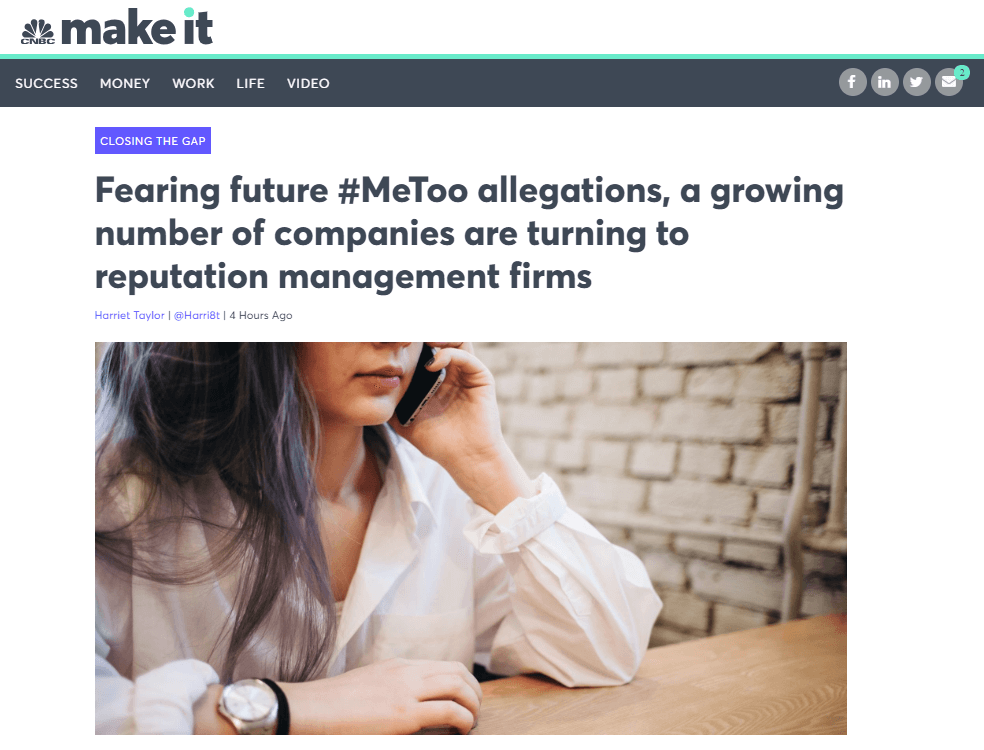
The business of protecting companies from sexual harassment scandals is booming.
Calls to reputation management firm Temin and Company quadrupled in 2018, according to president and CEO Davia Temin.
“Sexual harassment has not been one of our biggest areas of inquiry, up until now,” Temin tells CNBC Make It. But with the rise of the #MeToo movement, companies are finding themselves unprepared and facing huge legal liabilities. Temin’s business helps companies — including more than 15 in the Fortune 500 — find and address internal problems, before they become public.
When a company hires Temin and Company, the firm first conducts an in-depth study into the company’s leadership and corporate culture. Temin zeroes in on how persistent a culture of sexual harassment is at an organization and what the company is doing wrong, then makes recommendations at the governance level, including, in some cases, firing senior people. Many of Temin’s clients are in highly-regulated industries, like pharmaceuticals and finance. […read more]
A Year of Reckoning for Davos Man (and One Woman) in the Alps
Jeff Green, Bloomberg, January 20, 2019
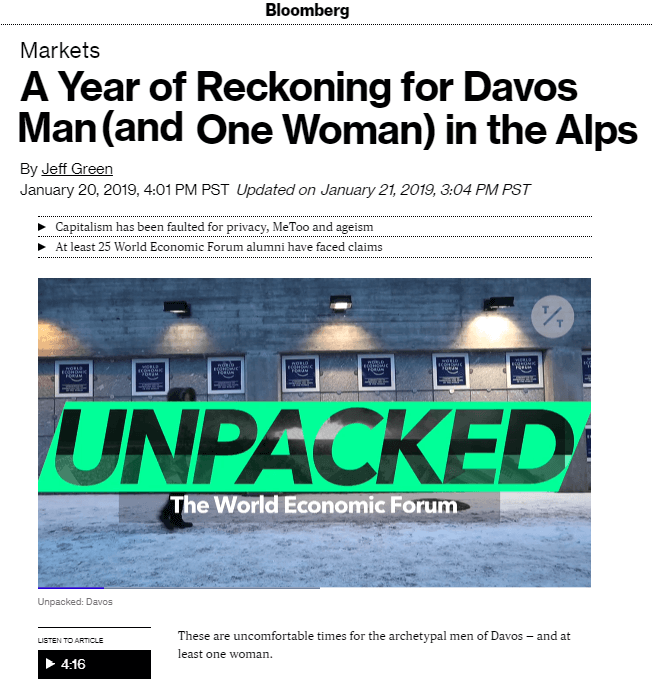
These are uncomfortable times for the archetypal men of Davos — and at least one woman.
Established in 1971 to support a global, capitalist vision of the future, the World Economic Forum in Davos this year also offers a reminder of the public humbling of some of its most visible champions. Dozens of the assembled business leaders and exemplars present and past have been brought low by a wide range of misconduct allegations, including sexual harassment, mismanagement and financial misconduct.
“At Davos they are both reflecting and setting the culture,” said Davia Temin, whose crisis consultant company has tallied more than 1,000 people, mostly men, accused of harassment and other misdeeds in the last year. That same list includes more than two dozen men who are present or past Davos attendees. “They reflect the culture of leadership, and sometimes looking in the mirror helps to spur the discussion.” […read more]
Amazon Execs Pool Stock in Revolt Against Board
Lindsay Frost, Agenda, January 11, 2019

A group of employees at Amazon are fed up with the lack of transparency and action the e-commerce giant has taken on climate change. So they decided to pool the shares given to them as compensation to file a proposal asking the company to disclose a solid plan on how to tackle the impacts of climate change. According to The New York Times, this is the first employee-sponsored shareholder resolution filed at a tech company.
This comes as employees begin to work more closely with shareholders to drive action on environmental and social issues impacting companies and the communities in which they operate. Experts predict that more employees, particularly those in the millennial generation, will begin to use their shareholder rights to bring these issues directly to the board. Boards should open the lines of communication to company employees and consider disclosing more about environmental and social issues, sources say.
“Employees are taking their employers up on their word to have a voice at the company, which isn’t just a good brand message anymore,” says Davia Temin, president and CEO of crisis consulting firm Temin and Co. “I don’t think this is going to go away any time soon. It’s probably going to become a staple of governance issues.” […read more]
Moonves Pay Punishment Caps Year of CEO Naming and Shaming
Jeff Green and Suzi Ring, Bloomberg, December 20, 2018
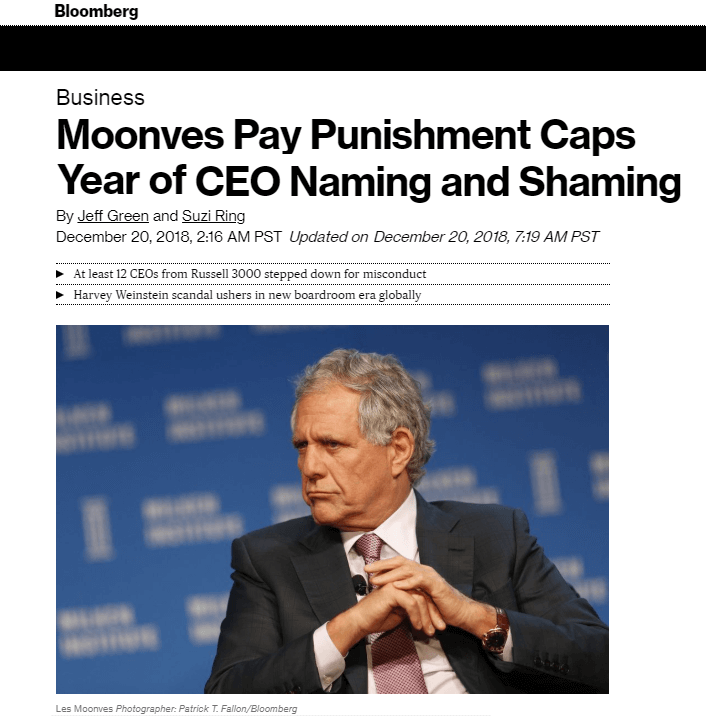
CBS Corp.’s decision to fire Chief Executive Officer Les Moonves and strip him of a $120 million payout caps an unprecedented year for naming-and-shaming in the corner office.
Corporate boards have been quicker to take action in 2018, now often announcing a CEO’s departure at the same time the misconduct was disclosed, said Davia Temin, founder of crisis consultancy Temin & Co. in New York. In October and November of last year, there were an average of 40 days between the first accusations and a firing. That has shrunk to almost zero now, she said, citing her database. […read more]
Woman Compiling MeToo Names Says They’re the ‘Tip of the Iceberg’
Jessica Brice and Jeff Green, Bloomberg, October 17, 2018
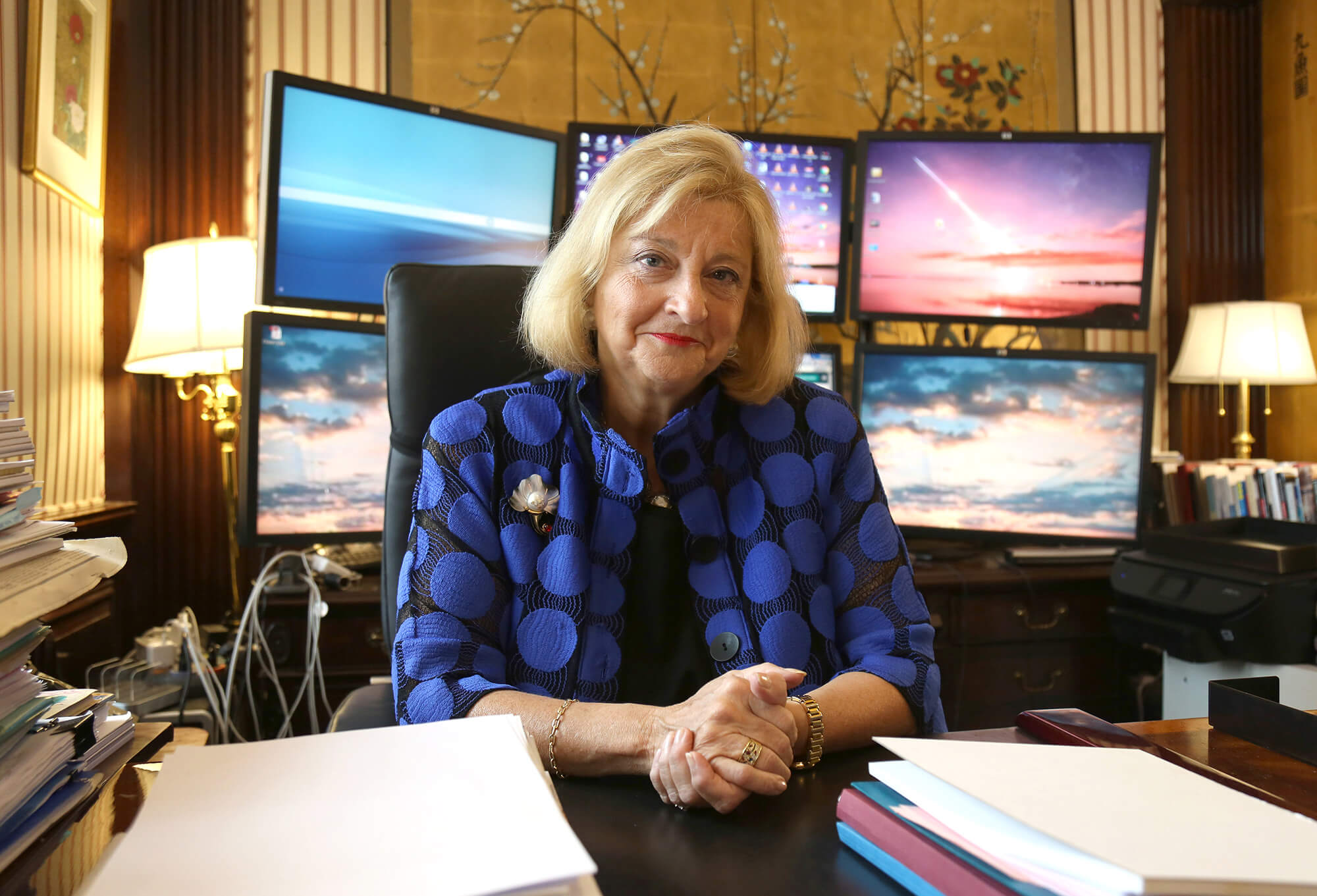
One year after the #MeToo movement began, Davia Temin’s team is still adding names to what’s known in her office as “the” index. It now totals more than 900, mainly men across the country (only 29 are women) accused of sexual harassment or assault or worse. The number’s still not very large, in Temin’s view.
“I’m sure this is the tip of the tip of the tip of the iceberg,” she said from the Manhattan headquarters of the crisis-management and consulting company she founded 21 years ago. “Believe me, you’re not hearing the worst stories. The worst cases — those people are still out there licking their wounds.” […read more]
Between Cosby and Kavanaugh — 810 High-Profile Public Figures Accused of Sexual Harassment
T&C Press Release, PR Newswire, October 3, 2018
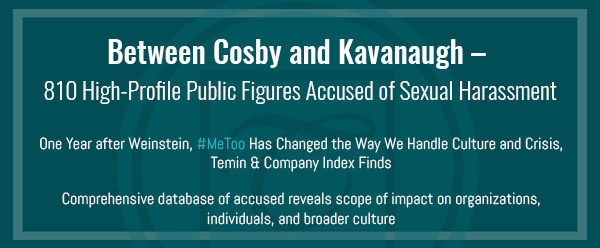
NEW YORK, Oct. 3, 2018 /PRNewswire/ — As the #MeToo movement has redefined “acceptable” conduct in every sphere of society — from the workplace to the university, from Hollywood to the Supreme Court — reputation and crisis management consultancy Temin and Company has logged 810 high-profile figures from Cosby to Kavanaugh accused of sexual harassment. This creates a comprehensive database of those accused of #MeToo-related conduct since the arrest of Bill Cosby in December 2015.
Among the 810 Temin’s “#MeToo Index” has tallied are: 234 in arts and entertainment; 192 in politics and government; 159 in business; 114 in media and broadcasting; and 63 in colleges and universities. “Every sector has been affected,” says Temin CEO Davia Temin, “and leaders — CEOs and board directors – are looking for insight on why, why now, and how we can address the reputational risk of toxic workplace cultures.”
Weinstein was the Watershed
“We are at a pivotal moment when several aspects of the movement, and its pushback, are converging,” Temin continues. “As the nation is fixated on the Kavanaugh hearings and FBI investigation, as well as Cosby’s sentencing as a ‘sexually violent predator,’ October 5 also marks one year since the explosive revelations of Harvey Weinstein’s decades of sexual misconduct. Our data tells us that these revelations opened the floodgates and set off the spike in allegations around the world.” Accusations averaged 6 per month between Cosby and Weinstein, and jumped to 78 in October 2017, 119 in November, and 103 in December. The average in 2018 is 42 per month. “We are seeing the public impact of these accusations in real time, and the power they have to marshal public sentiment, outcry, and action.”
No One Wants to be a “#MeToo Company”
As allegations around sexual misconduct and toxic culture increasingly dominate the news cycle, the consequences for organizations have risen exponentially. An SEC filing by CBS on September 28 revealed CBS has received subpoenas from the New York County District Attorney and the NYC Commission on Human Rights, as well as a request for information from the NYS Attorney General’s Office regarding allegations against Les Moonves, “CBS News and cultural issues at all levels of CBS.” “A dramatic shift is occurring in organizations everywhere, and corporate boards – especially women board members — are paying serious attention,” says Temin. “No one wants to be a ‘#MeToo company’ today.”
Metrics Bolster Narrative
“Personal narrative, fueled by social media, has transformed the #MeToo movement into a powerhouse very quickly,” Temin says. “But I believe it takes narrative combined with metrics — with research — to put the issue in context and fuel its next wave. One person’s story on social media, even anonymous, strikes a chord with others who have experienced the same thing, sometimes perpetrated by the same individual. Victims may have felt alone before, but then recognize that they have been part of a pattern. They then post their stories, sometimes anonymously as well. Their stories attract others who do affix their names, and a powerful trajectory of truth is begun.
“But you can lie with narrative as well. We all know that. It is the wise combination of metrics, personal narrative, and pristine due process that will bring us closest to long-hidden truths that have damaged women’s progress forever. That is why I started this Index.”
#MeToo Index: Highlights
Compiling data of allegations around sexual harassment, sexual assault, rape, workplace misconduct, and other related behavior, the continuously updated Temin #MeToo Index defines “high-profile” accusations as receiving at least seven mentions in the popular media. The database includes over 25 information fields, ranging from the accused’s age, industry, date of accusation and resolution, to political party. Highlights from the Index include:
- A steep explosion in numbers of public accusations occurred after Weinstein revelations in the New York Times – October 5, 2017:
- June, 2017: 10
- July, 2017: 10
- August, 2017: 9
- September, 2017: 11
- October, 2017: 78
- November, 2017: 119
- December, 2017: 103
- After the spike in accusations following Weinstein, the number of accusations per month has held relatively steady over the last 6 months:
- April, 2018: 28
- May, 2018: 39
- June, 2018: 24
- July, 2018: 39
- August, 2018: 41
- September, 2018: 35
- Entertainment, politics, and business draw most accusations:
- Arts & Entertainment: 234
- Politics & Government: 192
- Business: 159 (including 40+ in finance)
- Media & Broadcasting: 114
- Colleges & Universities: 63
- Final resolutions of cases (many still pending) include:
- 75 Arrested (Some before or after being fired)
- 18 Deceased (3 committed suicide)
- 146 Fired
- 211 Resigned
- 18 Retired
- 53 Suspended/Are on Leave
- 104 Lost Work (including entertainers or sports figures)/Other
- 221 No Repercussions
- 56 CEOs are the subject of accusations to date. 21 CEOs of public companies and 29 CEOs of private companies have had accusations revealed in the media, in addition to 6 nonprofit CEOs. In the nonprofit sphere, there are also 20 CEO-equivalents, including directors, founders, and presidents of prominent, heavily-funded national and international organizations, who have come under fire, with all 20 leaving their positions, although one was re-elected after being exonerated of the charges.
- Accusations of sexual misconduct cross party lines fairly evenly. For those in political office accused of misconduct, the split is fairly even between Democrats and Republicans: 76 Democrats vs. 70 Republicans.
- 97% of accused are male. Asia Argento captured media attention by being on both sides of the #MeToo debate – accuser and accused – but 787 of the 810 alleged perpetrators of sexual harassment or assault on the Temin #MeToo Index are male.
- The time between accusation to resolution has been growing shorter. As #MeToo begins to be seen as a real reputational risk, organizations are paying attention to and acting on complaints more quickly. Some are even announcing the resolution of a complaint at the same time they announce the accusation.
And, separately, in the business sphere:
- M&A deal risk: Financial impact in the M&A space came with the arrival of the “Weinstein clause” in mid-summer ’18, mandating additional due diligence of executive conduct in target companies and allowing acquiring firms to pull out if they found something they didn’t like.
- Asset management flight: Investors are seeing firms with sexual harassment complaints as an investment risk; some portfolio managers are staying away and others are questioning company management about their workplace culture issues and how they are dealing with sexual misconduct.
- Corporate investigations into company culture: “The best organizations are conducting deep dives into their corporate culture to better understand how sexual harassment is tolerated, and the dynamics at play in their workplace. Boards themselves are also more involved in addressing cultural insufficiencies in their companies than ever before – a role that used to belong almost exclusively to management and HR.”
“We are at the tip of the iceberg as more and more organizations continue or begin investigations into their cultures in general and #MeToo incidents in specific,” says Temin. “More incidents will come to light. Different sectors are reacting on different timelines, and with different levels of seriousness, but this is a movement toward fairness and safety that will not be stopped. It is inexorable.
“Organizations seeking to create cultures not only of safety, compliance and security, but of mentorship, innovation, purpose, and excellence, are demanding zero tolerance for this kind of misconduct and are demonstrating greater willingness to mete out consequences when required.”
Leading in a ‘MeToo’ Era
Wanda Wallace, “Out of the Comfort Zone,” Voice America, September 14, 2018
In the era of #MeToo, less and less silence surrounds cases of sexual harassment. Companies and leaders need to know what to do to prevent the problem in the first place as well as how to respond to accusations whether the case can be proven or not. Tune in to hear the experiences and advice from Davia Temin, who counsels boards, companies and leaders on how to manage their reputations especially in times of crisis. […read more]
To download the episode, CLICK HERE.
More News Articles



